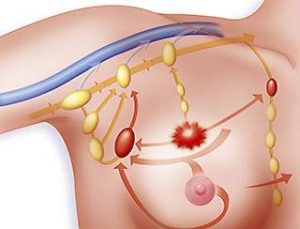“What’s important is that we have proven that omega-3s are the driving force in reducing Breast Cancer risk and not something else”
I used the word prevention in the headline because I am often overwhelmed by elaborate, disfiguring, painful and expensive therapies prescribed by breast cancer oncologists.
Managing a cancer diagnosis is as important and challenging as managing short, long-term and late stage side effects.
According to the study below, omega 3 fatty acid supplementation can reduce your risk of breast cancer and reduce your risk of relapse. I supplement with omega 3 fatty acids because they support my heart function and should help my cognitive function (help my chemobrain…). And help me remain in complete remission from my incurable blood cancer called multiple myeloma.

I supplement with Life Extension Super Omega 3 because this brand has been evaluated for efficacy and purity and approved by Consumerlab.com.
I am both a cancer survivor and cancer coach. Conventional therapies did little for me beside leaving me with lifelong chronic collateral damage. I admit that I am biased. However years of survival and research have taught me that cancer patients must draw on both conventional and non-conventional therapies.
Undergoing a lumpectomy for early stage breast cancer often makes sense as a first step. Radiation therapy may cause more damage than the risk reduction is conveys. Undergoing evidence-based, non-toxic therapies to reduce your risk of breast cancer relapse may by the best step for you.
To Learn More about Functional Foods- click now
Please scroll down the page, post a question or comment and I will reply to you ASAP.
Thank you,
David Emerson
- Cancer Survivor
- Cancer Coach
- Director PeopleBeatingCancer
Recommended Reading:
“A new study just published in the Journal of Nutritional Biochemistry appears to be the first to provide what the researchers call “unequivocal evidence that omega-3s reduce cancer risk.” What’s important is that we have proven that omega-3s are the driving force and not something else.”
Ma, who is an expert in how fats influence health and disease, added in the media statement that he hopes the study leads to more research on using diet to reduce cancer risk and on the benefits of healthy living. “Prevention is an area of growing importance. We are working to build a better planet, and that includes better lifestyle and diet,” he said. “The long-term consequences of reducing disease incidence can have a tremendous effect on the health-care system.”
“Omega-3 fatty acids and breast cancer survivorship- There is also interest in EPA and DHA for improvement of outcomes after a diagnosis of breast cancer. Breast cancer recurrence, cardiovascular events, weight gain and obesity, bone density loss, and chemotherapy-associated cognitive impairment and peripheral neuropathy are common concerns during the survivorship period. Although there is little in the way of definitive interventional trials, we will review here some of the more interesting preliminary results.
EPA and DHA and reduction of breast cancer recurrence- Higher intakes of EPA and DHA from dietary sources were reported to be associated with a 25% reduction in breast cancer recurrence and improved overall mortality in a large cohort of over 3,000 women with early stage breast cancer followed for a median of 7 years [69]. One reason for this observation may be enhancement of at least some types of chemotherapeutic cytotoxicity, which has been reported for concomitant administration of DHA with anthracyclines [70,71]. This enhanced cytotoxicity probably results from alteration in membrane lipid rafts, which increases surface expression and clustering of the death receptor CD95 in mammary cancer cell lines treated with EPA and DHA and doxorubicin [72]. Improved outcome with DHA added to chemotherapy in a small phase II trial has been reported in metastatic breast cancer patients [73]. This observation raises the question of whether cardiac toxicity might also be increased by adding EPA or DHA to anthracyclines, but this does not appear to be the case at least in rats [74].
EPA and DHA to reduce cardiac events- Cardiac events are the second most common cause of mortality in women with breast cancer, and the most common cause of death for women with stage I breast cancer over the age of 65. EPA and DHA reduce triglycerides and platelet aggregation and are thought to have an anti-arrhythmic effect. EPA and DHA supplementation have been noted to be associated with reduced cardiac deaths in the general population [75,76]. A highly purified prescription strength form of ~3.4 g/day EPA and DHA (Lovaza™, formerly omacor, 4 g/day) is US Food and Drug Administration approved for treatment of hypertriglyceridemia and has been shown to reduce triglycerides and nonhigh-density lipoproteins to a greater extent than a statin alone in individuals with mixed dyslipidemia and triglycerides >200 mg/dl [77]. This highly purified prescription formulation has also been shown to reduce cardiac events and mortality in individuals with a prior myocardial infarction at lower doses of 1 g/day [77]. However, a recent secondary prevention trial with 1 g/day EPA and DHA compared with 1 g/day olive oil did not show any cardioprotective effect [78]. A recent meta-analysis of EPA and DHA in moderate doses also showed no benefit [79]. The cause of these discrepancies is open to speculation. Possibilities include the following: 1) a lack of additional benefit for EPA + DHA in women with cardiac disease already on optimal medical management; 2) the placebo, often olive oil, may also have cardiovascular benefit; 3) or the highly purified forms of EPA + DHA may have special properties such as lower reactive oxygen species than less purified forms of fish oil [80]. Trials such as the VITAL trial in women without a prior history of heart disease will be of great interest.
EPA and DHA to reduce bone density loss and arthralgias- Loss of bone density and increased fracture rate are a side effect of premature menopause caused by cytotoxic chemotherapy or surgical ovarian ablation in premenopausal women or use of aromatase inhibitors in postmenopausal women. EPA and DHA probably inhibit RANK ligand and osteoclast formation [81]. A small randomized pilot trial suggests that 3 g/day EPA and DHA inhibits bone reabsorption in individuals taking aromatase inhibitors [82]. The anti-inflammatory activity and beneficial effects of EPA and DHA on rheumatoid arthritis have led to a clinical trial of high-dose EPA and DHA versus placebo in women who have aromatase inhibitor-induced arthralgias. This cooperative group study of 262 women has been reported in abstract form and no benefit was observed [83]. A small randomized trial of omega-3 fatty acids to protect against taxane-induced neuropathy suggests benefit [84] and further studies are needed.
EPA and DHA to prevent insulin resistance and sarcopenic weight gain- EPA and DHA help prevent obesity and insulin resistance particularly in animal models fed a high-fat diet [85,86], but effects in humans have yet to be proven. Sarcopenic weight gain is common during adjuvant chemotherapy for breast cancer. The anabolic effects of EPA and DHA might help reduce muscle mass loss and weight gain during treatment and weight gain following diagnosis, but studies in this area have yet to be conducted [87,88]. Results of the Muscle Mass, Omega-3, Diet, Exercise and Lifestyle (MODEL) trial in healthy individuals aged >70 years examining the effects of 90 minutes of exercise weekly, vitamin D3 (2,000 IU/day) or 1 g EPA and DHA daily are awaited with interest [89].
EPA and DHA and cognition- Cognitive abnormalities are observed in 20 to 70% of women after chemotherapy depending on the agents used, intensity and duration of treatment, predisposing factors, and type and scoring of cognitive tests [90,91]. DHA is the most abundant PUFA in the brain and is involved in multiple functions including cell signaling, neurogenesis, neuroprotection, and learning and memory [18]. A number of epidemiologic studies show a 40 to 50% reduction in risk of multicause dementia with increased dietary intake of DHA or increased blood levels of DHA [19]. In meta-analyses, DHA supplementation improves attention, processing speed and immediate recall, learning, and memory in individuals with cognitive impairment without dementia but not in those with dementia [92,93]. Probable mechanisms include suppression of oxidative stress [94], decreases in proinflammatory lipid derivatives from AA, an increase in inflammation resolving and protective lipid derivatives, enhanced production of neurotransmitters [95], and reduced production and accumulation of amyloid B peptide toxin [19]. Doses of DHA administered as supplements for cognitive improvement are generally in the range of 1,800 mg/day. Studies utilizing DHA or DHA + EPA as a neuroprotectant during chemotherapy are needed.
Conclusion-The inflammation-resolving properties and favorable effects of EPA and DHA on oncogenic proteins, as well as on the cardiovascular, bone, and central nervous system, make them excellent candidates for primary and secondary breast cancer prevention trials for individuals at increased risk as well as breast cancer survivors. Interventional trials in these cohorts are ongoing.
APPIP ERROR: amazonproducts[
AccessDeniedAwsUsers|The Access Key Id AKIAJAJ37JVNL7OUU4CA is not enabled for accessing this version of Product Advertising API. Please migrate your credentials as referred here https://webservices.amazon.com/paapi5/documentation/migrating-your-product-advertising-api-account-from-your-aws-account.html.
]




